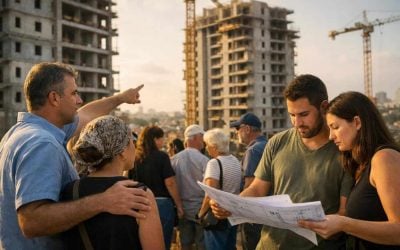Israel’s real estate market in early 2025 exhibits resilience, despite economic pressures and geopolitical complexities. Key trends include settlement growth in the West Bank, ambitious urban projects in Tel Aviv, and internationally-backed proposals for the redevelopment of Gaza. Below is a comprehensive analysis highlighting these major developments and their implications.
Settlement Development and Housing Expansion
Between late 2023 and late 2024, Israel advanced substantial residential development plans in Judea and Samaria (commonly known internationally as the West Bank), including neighborhoods in East Jerusalem. Israeli authorities have approved the construction of approximately 42,000 new residential units to accommodate increasing population demands. These housing projects are intended to support the natural growth of existing communities, home to over 720,000 Israeli citizens.
However, international bodies, including the UN Human Rights Council, have repeatedly criticized these developments, claiming they breach international law. Israel contests these claims, arguing historical ties and security considerations justify settlement expansions. CurRently, Israeli residents in these areas coexist with approximately 2.8 million Palestinian residents, illustrating complex demographic and political dynamics.
Tel Aviv’s Landmark Skyscraper: Bein Arim Tower
Tel Aviv municipality has approved plans for an ambitious skyscraper, the Bein Arim Tower, which at around 405 meters tall, will soon become Israel’s most prominent architectural symbol. Scheduled for completion by 2030, this high-rise will surpass the existing Azrieli Sarona Tower and feature approximately 102 floors dedicated to offices, retail establishments, and luxury hospitality services. Notably, the upper levels are designated for an international hotel chain, reflecting Tel Aviv’s growth as a business and tourist destination. This skyscraper, strategically located near the central Savidor train station, aligns with Israel’s push for modern infrastructure and global appeal.
Gaza Redevelopment Initiative and International Debate
Former U.S. President Donald Trump recently proposed an innovative plan aimed at transforming the Gaza Strip into a high-end tourism destination, branding it the “Middle Eastern Riviera.” Central to this ambitious proposal is the controversial idea of relocating Gaza’s Palestinian population to facilitate reconstruction. The proposal, positioned as an economic revitalization plan, has attracted both international interest and criticism due to the complex humanitarian and legal questions it raises. Israel sees potential benefits in regional stability and economic opportunities, although significant logistical and political challenges remain.
Housing Market Trends and Pricing Dynamics
Israel’s residential real estate market is experiencing strong demand against a backdrop of increased housing supply. January 2025 data highlights a surplus of approximately 80,000 newly built Apartments still on the market, marking a peak not seen in decades. This reflects vigorous construction activity aimed at addressing Israel’s long-standing housing shortages, especially in urban hubs like Tel Aviv, where thousands of units remain available despite continued interest from domestic and international buyers.
Home Prices across Israel have consistently risen, showing a 7.6% annual increase by late 2024. This growth is especially pronounced in Tel Aviv and surrounding regions, driven by persistent demand from a growing population, limited space, and foreign investment influxes.
Rental Market Conditions and Urban Development
Rental prices nationally climbed by approximately 4.5% last year, with Tel Aviv rents remaining notably higher than national averages. Though rental increases in Tel Aviv moderated slightly—rising around 3.7%—affordability remains challenging due to the city’s elevated prices. The Tel Aviv rental market has recently experienced a softening due to abundant new units from urban regeneration efforts, yet the city remains Israel’s priciest housing locale.
Government Policies and Financial Trends
Taxes and Market Cooling Efforts
In an effort to moderate escalating housing costs, Israel increased the Value Added Tax (VAT) on new properties from 17% to 18% effective January 2025. Additionally, a new capital gains surtax of approximately 1.5% was imposed on wealthy property sellers, intended to discourage speculative real estate investment and channel revenues toward national economic recovery after recent conflicts.
Support for Immigrants and Young Families
Conversely, the government also implemented measures to support specific demographic groups. Recent legislation significantly reduces purchase taxes for new immigrants (olim) on their first Israeli home purchase, encouraging investment by diaspora communities and returning Israelis. Additional programs promoting affordable housing through government-led initiatives, like the state-run “Dira Le’haskir,” emphaSize long-term affordable rentals, particularly in high-demand locations such as Tel Aviv’s Sde Dov district.
Mortgage Market and Interest Rates
High mortgage interest rates, held steady by the Bank of Israel at approximately 4.5%, remain a significant factor affecting affordability. Mortgage lending slowed slightly after peak activity in late 2024 but remains elevated compared to earlier periods. Banks have tightened lending criteria to manage risk, prompting some buyers to delay purchases until anticipated rate reductions later this year.
Investment Climate and International Appeal
Foreign Investment Resurgence
Foreign investment has steadily increased, with diaspora Jewish communities particularly active in purchasing Israeli real estate. Groups from the United States, notably from Iranian-American Jewish communities, recently made substantial apartment acquisitions in locations like Kiryat Ono and Beit Shemesh. High-value real estate in Tel Aviv and Jerusalem remains especially attractive to foreign investors, reinforcing Israel’s international reputation as a secure investment environment, particularly amid rising global antisemitism.
Institutional Investors Shift Focus Domestically
Israeli institutional investors are increasingly directing capital back to local real estate ventures after prior years of significant overSeas investments. This pivot has positively impacted Israeli property stocks on the Tel Aviv Stock Exchange, reaffirming investor confidence in the domestic market.
Infrastructure Developments and Future Prospects
Strategic Infrastructure Investments
Long-term growth is expected from significant infrastructure upgrades, notably the extensive Tel Aviv Metro project and major road expansions, enhancing connectivity and property values region-wide. Additionally, urban renewal projects, especially in Tel Aviv and Jerusalem, are key drivers for future housing supply, replacing older structures with modern, higher-density housing.
Post-Conflict Economic Resilience
Following disruptions caused by the Gaza conflict in late 2023, Israel’s real estate sector demonstrated remarkable resilience, quickly recovering transaction volumes and prices post-conflict. Government incentives have accelerated rebuilding efforts, particularly in southern regions heavily impacted by hostilities, supporting long-term economic recovery and stability.
Industry Insights from Eilat Conference
In March 2025, industry leaders gathered at Israel’s annual real estate summit in Eilat, where discussions addressed balancing infrastructure improvements, affordability challenges, and regulatory efficiency. Participants expressed optimism, emphasizing that strategic planning, streamlined bureaucracy, and political stability could position Israel’s real estate sector for sustainable growth, benefiting investors, residents, and the broader economy.
Conclusion:
Israel’s real estate market, while facing domestic and international pressures, remains vibrant, driven by continued demand, robust policy interventions, and strategic infrastructure investments. With a cautiously optimistic outlook, the sector appears poised for further growth and resilience in the face of geopolitical challenges, reinforcing Israel’s attractiveness as a destination for global and domestic capital alike.




